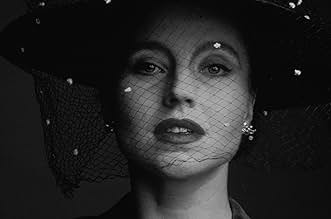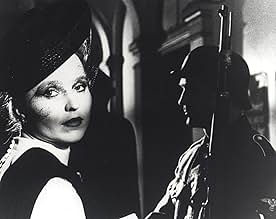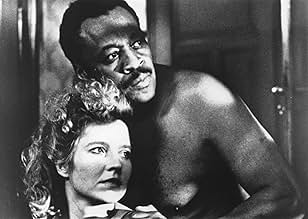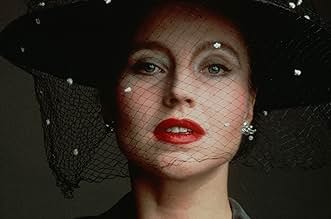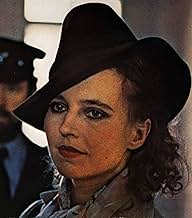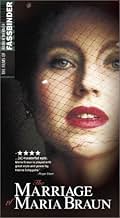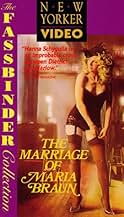Mary se casa com Hermann Braun nos últimos dias da Segunda Guerra Mundial, apenas para que ele desapareça na guerra. Maria, sozinha, usa sua beleza e ambição para encontrar prosperidade dura... Ler tudoMary se casa com Hermann Braun nos últimos dias da Segunda Guerra Mundial, apenas para que ele desapareça na guerra. Maria, sozinha, usa sua beleza e ambição para encontrar prosperidade durante o milagre econômico da Alemanha dos anos 50.Mary se casa com Hermann Braun nos últimos dias da Segunda Guerra Mundial, apenas para que ele desapareça na guerra. Maria, sozinha, usa sua beleza e ambição para encontrar prosperidade durante o milagre econômico da Alemanha dos anos 50.
- Direção
- Roteiristas
- Artistas
- Prêmios
- 13 vitórias e 7 indicações no total
- Bill
- (as George Byrd)
- Hans Wetzel
- (as Günther Lamprecht)
Avaliações em destaque
Without wishing to give too much away, it tells the tale of a woman who, seeing the desolate landscape that Germany was in 1945, determines to build herself a comfortable life and, as she does so, she becomes one of many women in Germany rebuilding the nation. This was a time, historically, when the women were a greater driving force in the social and economic rebuilding of the nation than were the men (who were both lacking in credibility following the horrors and the mess of the years past, and somewhat dazed by what the nation had just been through).
As she builds that life (and in so doing helps to rebuild the nation), however, she finds that she may have sacrificed too much.
It is a movie worth watching in order to gain some understanding of what life was like in Germany from 1945 to roughly 1970. Rainer Fassbinder makes use of images in places which show the transition of German society from broken ruins to economic superpower, the changing status of women in German society over that time period, the changing attitudes both within Germany and from outside toward Germany, and the sacrifices that women were prepared to make in order to build the Germany that they ultimately did. It also asks, though, if the single-minded pursuit of rebuilding the nation economically and materially did not take too much out of the nation and the people in other areas.
I enjoyed the movie, and am happy to recommend it.
The Marriage of Maria Braun is a film that operates on two different levels. On the one hand in can be seen as a look at one woman's struggle against adversity in the hardships of the post war years. While on another, the film can clearly be read as a critique of the way the new Germany forgot it's awful past and sold it's soul in order to prosper in what would become known as the German Economic Miracle. This latter reading can be determined by reading the main narrative as an allegory in which Maria Braun represents the new Germany. She begins by prostituting herself to the Americans and ends very wealthy but emotionally dead; she forgets her past quickly in order to concentrate on her future.
There is no doubt that Rainer Werner Fassbinder put together a clever allegorical film here. And there is also no doubt that Hanna Schygula is very good in the lead role. But I did have difficulty with empathising with the people in this story, as none of them were particularly likable. Perhaps that was the point of course. But, whatever the case, the film left me cold unfortunately.
This is a Modern Classic, one of the very best films to come out of the 1970s/80s German Cinema. Much stronger than "Veronica Foss" and in the league of "Das Boot", "The Marriage of Maria Braun" is a product of Modern German Dramatic Cinema's golden age. No sugar coating, just pure, unadulterated truth as seen through the rear-view mirror of people who have lived the horrors and survived into new tomorrows. A true gem of a film!
Você sabia?
- CuriosidadesInspired by "Mutter Courage und ihre Kinder" (1938/39), a play by Bertolt Brecht, and Serpente de Luxo (1933).
- Erros de gravaçãoAt the end of the cut of the two kids blowing up the firecrackers, they start laughing but no sound is heard. The sound of laughter is heard on the next cut after they get yelled at by the man scavenging for wood.
- Citações
Maria Braun: I'm a master of deceit: a capitalist tool by day, and by night an agent of the proletarian masses - the Mata Hari of the Economic Miracle.
- Cenas durante ou pós-créditosAt the very end of the credits the following persons are 'credited' by their picture: Konrad Adenauer, Ludwig Erhard, Kurt Georg Kiesinger and Helmut Schmidt and a disconnected phone line can be heard.
- Trilhas sonorasIn The Mood
Written by Wingy Manone, Andy Razaf and Joe Garland
Principais escolhas
- How long is The Marriage of Maria Braun?Fornecido pela Alexa
Detalhes
- Data de lançamento
- País de origem
- Centrais de atendimento oficiais
- Idiomas
- Também conhecido como
- The Marriage of Maria Braun
- Locações de filme
- Empresas de produção
- Consulte mais créditos da empresa na IMDbPro
Bilheteria
- Orçamento
- DEM 1.975.000 (estimativa)
- Faturamento bruto nos EUA e Canadá
- US$ 8.144
- Fim de semana de estreia nos EUA e Canadá
- US$ 11.623
- 16 de fev. de 2003
- Faturamento bruto mundial
- US$ 11.869


